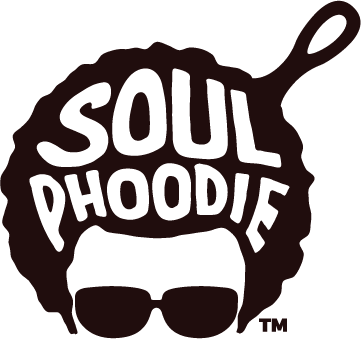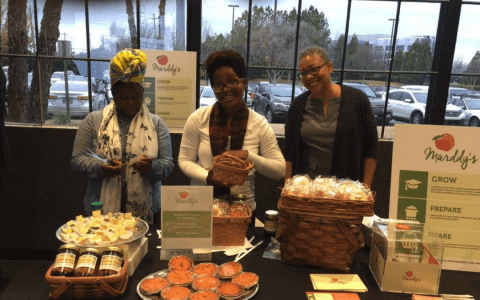by
Located in the west side of Atlanta, Georgia, is Marddy’s, a shared kitchen and marketplace that’s supporting small businesses in the neighborhood.
Short for “Market Buddies,” Marddy’s is a licensed facility that provides a shared space for home cooks to prepare and sell their goods to customers. Participating chefs have access to a commercial kitchen, an online and in-store marketplace, and professional training in Brand Strategy Development and ServSafe Food Safety Certification.
Nevertheless, Marddy’s founder Keitra Bates has a vision for the facility that goes beyond food.
Bates is a participant in NPR’s Kitchen Table Conversations, a series that has been following the experiences of Americans since President Trump took office. From finances to health care, the political series delves into the concerns, opinions, and experiences of voters of various backgrounds.
In a recent article for NPR, Bates shares her dream to improve opportunities for food entrepreneurs in the West Atlanta community. Her journey began in early 2017 in the midst of uncertainty regarding the changes the new administration would bring. At the time, Bates had closed her pizzeria business and was looking for new ways to pursue her career while helping others in the ever-changing neighborhood, where local black businesses were facing increasing challenges.
With the rise of gentrification, changes in the community put local black businesses at risk. Rising rents have cut opportunities for smaller business, leaving home cooks with fewer locations where they can sell their offerings.
An “Our History” statement on the Marddy’s website summarizes it best:
“Because of shifting demographics, their customer base is being displaced by higher earning newcomers and their traditional distribution channels are closing. Although they earn higher wages, the newcomers do not frequent the business where the home cooks are allowed to peddle their offerings.”
After buying a run-down building on Fair Street that had been neglected for years, Bates created Marddy’s Shared Kitchen and Marketplace to create a space for home chefs to operate their business and keep the “culinary traditions” of the neighborhood alive.
“These people have created a business with their talent and they have a right to survive,” says Bates.
Two years post-purchase, Bates has given the building a welcoming makeover with a coral-painted exterior and a cozy interior filled with décor.
Marddy’s has since become a flourishing workplace for home cooks in the community, providing new business for black entrepreneurs. From an elderly couple selling sweet potato pies to the group Gangstas to Growers–which teaches youth who were previously incarcerated to grow peppers and sell homemade hot sauce–Marddy’s is a hub of opportunity for many.
Raisha Williams, “the Cookie Lady,” is one of the food entrepreneurs able to make and sell her products there. Williams started her business ten years ago and would visit local barbershops to sell her homemade cookies. With access to a commercial kitchen, she sees Marddy’s as an opportunity to help her business expand.
Haylene Green, the self-proclaimed “Garden Queen,” is another vendor looking forward to the opportunities Marddy’s provides. Green runs the West End Community Garden and is working towards selling goods such as traditional Jamaican soups and teas on the wholesale market.
In addition to supporting local food entrepreneurs, Marddy’s is preserving a rich history of black businesses in the area.
Before becoming the home of Marddy’s Shared Kitchen, the Southwest Atlanta building was known as Leila’s Dinette, a black-owned diner in business from the late 1940s through the 1980s. Owned by Leila Williams, who recently celebrated her 106th birthday, Leila’s Dinette was frequented by local HBCU students and civil rights leaders who often held strategy sessions there. Notable figures such as Rev. Martin Luther King, Jr. and President Jimmy Carter also ate at the historic location.
Bates hopes to continue to use the space as an integral part of the community that brings people together. She’s partnered with other local organizations such as The Village Micro Fund, which supports entrepreneurs in the Metro Atlanta Area.
Marddy’s is an example of how togetherness creates a powerful network for success. Bates says, “This is part of our community and how we support each other.”


